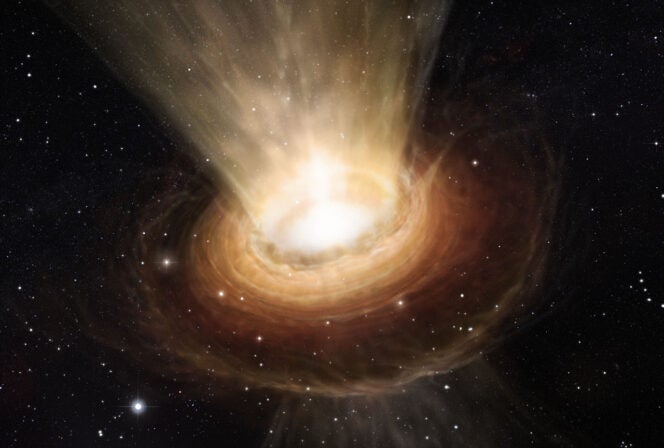The Independent's journalism is supported by our readers. When you purchase through links on our site, we may earn commission.
Early-universe black holes produced winds so powerful they slowed their own growth
In the early days of the universe, black holes grew faster than galaxies. New research helps astronomers understand how black holes and the galaxies that host them came into balance.

Supermassive black holes in the early cosmos huffed and puffed so powerfully that they blew their own food away, slowing their growth and giving their host galaxies time to evolve.
That’s the new and unexpected finding of a new paper published Thursday in the journal Nature.
A team of researchers led by scientists at the Italian National Institute for Astrophysics in Trieste set out to study the gas between galaxies in the very early universe using the European Southern Observatory’s Very Large Telescope Chile. The researchers used the telescope to observe 30 quasars, the very bright centers of very distant galaxies thought to be powered by supermassive black holes, all existing within the first 500 million to one billion years of the universe — a period known as
Black holes produce winds — outflows of radiation and charged particles — as they feed and the matter falling into them swirls and compresses as it spirals down the drain. The researchers found that about half of the quasars they observed had winds more powerful than younger, closer quasars in the universe, according to Manuela Bischetti, a postdoctoral researcher at the Italian National Institute for Astrophysics and the first author of the study.
“Unlike what we observe in the universe that is closer to us, we discovered that black hole winds in the young universe are very frequent, have high speeds,” she said in a statement, “up to 17 percent of the speed of light, and inject large amounts of energy into their host galaxy.”
These high-velocity black hole winds, and the energy they release into the host galaxies of early-universe supermassive black holes, might be the key to understanding how these black holes ever stop eating long enough to allow their surrounding galaxies to evolve.
Past observations have shown that early-universe supermassive black holes grow much faster than younger, closer supermassive black holes, according to Italian National Institute for Astrophysics researcher and co-author of the new study Chiara Feruglio. These distant black holes actually grow faster than their host galaxies.
“Whereas in the local universe we know that black holes and galaxies co-evolve,” Dr Feruglio said. “This implies that a mechanism must have acted at some point in the Universe, slowing down black hole growth.”
The fast and highly energetic black hole winds the research team observed may be that mechanism. They estimate in the paper that the winds of early-universe supermassive black holes injected their host galaxies with 20 times more energy than do black holes in the local universe, and posit that this energy transfer slowed down the flow of matter into the black holes, slowing their growth.
“This has a huge impact on our knowledge of the initial phases of growth of black holes and their host galaxies,” Dr Bischetti said in a statement, “setting strong constraints on the models that describe the formation of the first galaxies.”
And understanding how supermassive black holes and the earliest galaxies came to find a balance is important beyond what it tells astronomers interested in the early days of the universe. Since astronomers believe the winds from the supermassive black holes at the center of galaxies could influence the development of stars and star systems in those galaxies, understanding how black holes and galaxies evolve together is crucial for understanding how planets like Earth, and life, got a chance to develop.
Subscribe to Independent Premium to bookmark this article
Want to bookmark your favourite articles and stories to read or reference later? Start your Independent Premium subscription today.

Join our commenting forum
Join thought-provoking conversations, follow other Independent readers and see their replies